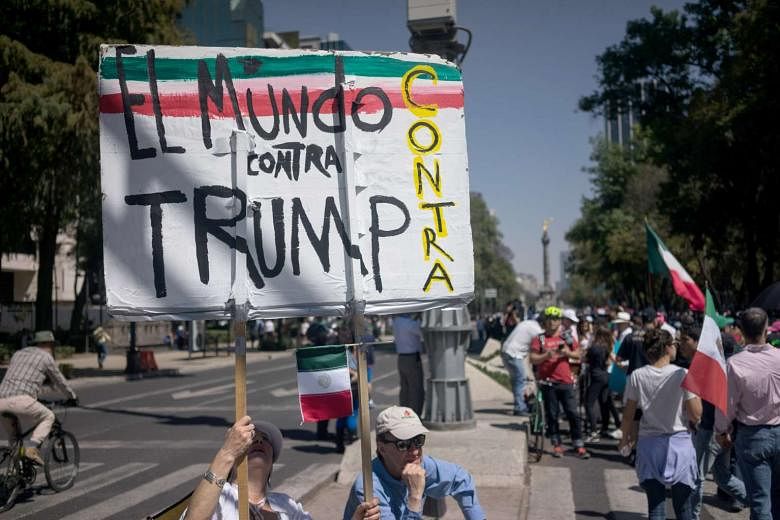Nirmal Ghosh Singapore and other smaller trade partners of the United States are unlikely to draw any punitive trade action soon from the Trump administration, analysts say - this is especially so for Singapore as the US has a trade surplus with the Republic.
There is some risk of Singapore being "side-swiped" if the US gets into a trade war with China and global supply chains become affected. But analysts who spoke to The Straits Times did not appear to think the risk was acute.
With US Trade Representative-designate Bob Lighthizer yet to be confirmed, the Trump administration's promised overhaul of trade policy has been slow to materialise. When it does materialise, the North American Free Trade Agreement (Nafta) and China will be the first targets.
"They are focusing on the major players and especially the countries with which the US has a trade deficit first, before they pay attention to anyone else," Mr Kevin Cottrell, research director at Bower Group Asia, a Washington think-tank, told The Straits Times.
America imports more than it exports. According to the website of the Office of the US Trade Representative (USTR), the goods and services trade deficit with China - by far the biggest with any country - was US$336.2 billion (S$470.5 billion) in 2015. The deficit with Mexico in 2015 was US$49.2 billion.

At his address at the Conservative Political Action Conference last week, Mr Trump mentioned trade, and said his team had not found a single country where the US had a successful trade relationship - that is, a surplus rather than a deficit.
But with respect to Singapore, America's trade is in surplus. The USTR lists the 2013 goods trade surplus - the latest on its website - as US$13 billion, which was up 25.3 per cent from 2012.
Singapore was the US' 13th largest export market in 2013. The balance of trade still favours the US, analysts say.
"Since Singapore has a free trade agreement with the US, eventually the US will get to looking at it. But it will probably not be a priority as the US sees it has a surplus and there is nothing glaringly obvious to call for attention from the White House," Mr Cottrell told The Straits Times.
Conservative economists blame lopsided trade terms favouring China for draining millions of American jobs, as companies relocated to China to take advantage of cheaper costs there. The Economic Policy Institute maintains that 2.6 million American manufacturing jobs were lost between 2001 and 2015 due to offshoring to China. Mr Trump has threatened to label the country a currency manipulator and impose a tariff of as much as 45 per cent on imports from China.
Speaking on Fox News on Jan 29, Dr Peter Navarro, head of President Trump's National Trade Council, said the US would pursue bilateral trade agreements, particularly with countries with which the US had a trade deficit. He named Japan, Australia, New Zealand, Malaysia and Thailand.
Mr Cottrell said the Trump administration does have the potential to "cause a disturbance to how trade works globally and especially within Asia, because Asia has put a strong focus on regionalism and building up multilateral agreements that support the supply chain model, that makes trade more efficient".
Trade action in any case has been delayed as Mr Lighthizer has yet to be confirmed by Congress. He needs a special waiver because he once represented Chinese and Brazilian interests.
Mr Jeffrey Schott, an expert on trade at the Peterson Institute of International Economics, told The Straits Times: "None of this (reviewing and negotiating trade deals) is on the radar screen of the administration right now; they don't have many people in place yet, and they are concentrating on the North American Free Trade Agreement."
The agreement involves Canada, the US and Mexico, and has also been blamed for leaching jobs from the US, principally to Mexico.
"You don't have the trade team in place in either the Commerce Department or the USTR so it's hard for the senior-level career service to make decisions without political direction," Mr Schott said.


